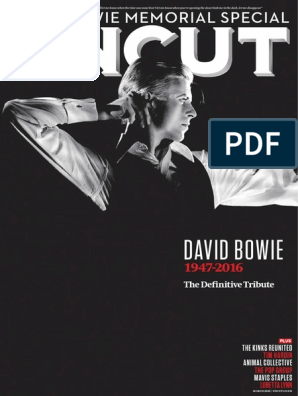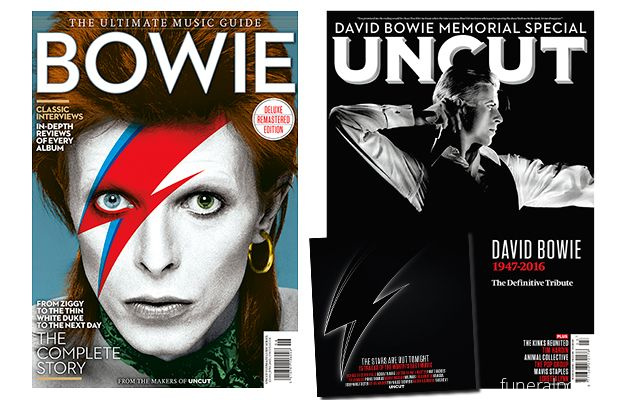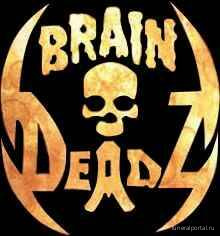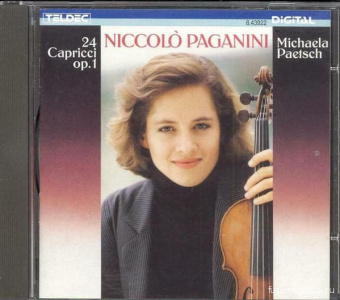
DAVID BOWIE MEMORIAL SPECIAL
https://ru.scribd.com/document/325253609/Uncut-March-2016-pdf
ABC South West Vic / ByMatt Neal
A still capturing David Bowie's distinctive look in the Life On Mars? film clip.(Supplied)
When David Bowie died in 2016, fans and musicians had an enormous catalogue of songs to sift through to find the perfect one to sum up his career, influence and death.
One song that featured prominently in tributes to the musical icon was Life On Mars?, a piano-led ballad from his 1971 album Hunky Dory that captured the poetry and creativity of Bowie at his best as well as the emotion and melancholy of his passing.
Fifty years on from its recording in August 1971, the song stands as an epitaph to this remarkable musician, which makes it all the more bizarre to realise Life On Mars? was born out of revenge against Ol' Blue Eyes himself, Frank Sinatra.
'It's a god-awful small affair…'
In 1968, Bowie was an ambitious songwriter with several failed bands and a low-selling debut solo album in his wake.
Keen to flex his songwriting muscles wherever possible, Bowie took on assignments from his publishing company to compose new English lyrics to foreign pop songs.
Among them was a 1967 French song called Comme d'habitude.
"I wrote some really terrible lyrics [to it] — I think it was called Even A Fool Learns To Love," Bowie told Michael Parkinson in a 2002 interview.
"I sent it back again and I thought that will be the last I hear of that.
"Then I hear it on the radio and I thought 'That's that tune, it must be my song … but hang on, these are different lyrics', and it was Sinatra singing My Way."
Unbeknown to Bowie, songwriter Paul Anka had purchased the rights to Comme d'habitude, rewritten it as the now-famous swan song, and gifted it to Frank Sinatra.
"That really made me angry for so long — for about a year," Bowie joked to Parkinson.
"Eventually I thought, 'I can write something as big as that, and I'll write one that sounds a bit like it'.
Musically, both songs have a bass line that steps down a semi-tone through the verse, although Life On Mars? flips this idea in different ways by changing keys and going up in semi-tones in the pre-chorus.
Bowie even acknowledged the "revenge trip" in his own oblique way on the back of the Hunky Dory album — next to the tracklisting for Life On Mars? a handwritten scrawl reads "Inspired by Frankie".
'It's the freakiest show…'
The song was recorded in August 1971, with the core musicians being future members of Bowie's famed Spiders Of Mars line-up — Mick Ronson on guitar (he also wrote the string parts), Trevor Bolder on bass, and Mick 'Woody' Woodmansey on drums.
On piano was Rick Wakeman, who recorded his parts on the same piano The Beatles used to record Hey Jude.
Wakeman would go on to be a key member of prog-rock band Yes, and the piano would go on to feature on Elton John's Goodbye Yellow Brick Road, and numerous Queen albums (although not Bohemian Rhapsody, despite what some people on the internet claim).
Two days after Bowie's death, Wakeman appeared on BBC Radio 2 to perform an instrumental version of the song and recollect its recording.
"It had every single ingredient.
"The great thing about David was he was a wonderful melody man, but it wasn't just the melodies — he had great ideas for chord structures and would always throw in the odd surprise when you were least expecting it."
'The film is saddening bore…'
Interpreting those complex chords and melodies are a challenge for any musician, but it was one that had to be tackled by a unique tribute band called The Thin White Ukes — a ukulele trio led by music journalist Michael Dwyer.
"It's a really sophisticated song musically," Dwyer said.
"It was one of the most challenging things we've ever done and we put it off for a really long time because it's perfection as it's recorded.
"[But we were] aware that when people come to see a David Bowie tribute that it's one of the songs that they expect to hear."
But it's the lyrics — "a gloriously strange sci-fi anthem" as one writer put it — that really spoke to Dwyer as a young man.
He said the title is a great metaphor, hinting at the remainder of an unasked question — "is there life on Mars, because there sure as hell isn't any down here?".
"The thing I identify with, and I think so many people identified with Bowie originally, was he was a very normal kid in a dead-end middle-class life who dared to dream," Dwyer said.
The Thin White Ukes are keeping the music of David Bowie alive, but with a difference — they're using ukuleles.(ABC South West Victoria: Matt Neal)
"I was that kind of desperate suburban kid going to the movies and thinking, 'Is this the best you've got? Surely life is more than this. Please tell me there's something more than this'.
'She walks through a sunken dream…'
Something For Kate frontman Paul Dempsey has also added the song to his solo setlist, in part because "it's an astounding song" but also as a way to test himself.
Paul Dempsey (centre) with his band Something For Kate.(Supplied)
"That note he hits in the chorus when he sings 'Life on Mars' … for me to get up there is … really pushing myself," he laughed.
"It's one of those songs that's just so grand in scale and intimidating in its orchestration and complexity, and they're the types of songs that I try and cover by myself with an acoustic guitar because they really present a challenge."
Dempsey remembered being "swept away by the strings" when hearing the song as a kid, and later being impressed by the combination of the electric guitar solo with the orchestra.
But the song is now linked to Dempsey's memories of seeing it performed every night as part of Bowie's 2004 tour of Australia, for which Something For Kate was the opening band.
David Bowie died at the age of 69 in 2016, and is considered to be one of the most influential musicians of the 20th century.(Supplied)
"The version he did [on that tour] was just him and [pianist] Mike Garson … so it was really stripped back, almost a slightly cabaret version of the song, and it was just stunning," Dempsey said.
"I think my strongest memories of the tour are actually just the soundchecks when everyone was relaxed and hanging out and chatting, and David himself was just so friendly and welcoming to us.
"We didn't expect that … we didn't even expect necessarily that we'd get to meet him. But he was so friendly … he was so normal.
"So you're just kind of chatting away with this lovely, nice person, and it's not quite clicking, who you're talking to, and then it's only 20 minutes later, you kind of go, 'Shit, I was just talking to David Bowie'."
'But her friend is nowhere to be seen…'
When Bowie died in 2016, Dempsey could not bring himself to listen to any of Bowie's music — least of all the Blackstar album, which came out just two days before Bowie's death and is viewed as his farewell gift to fans.
For fellow singer-songwriter Sarah Blasko, there was no avoiding Bowie's music. In the days following his death, she was approached by triple j to perform a tribute to the legendary artist.
"I was really honoured to do that [but] it was a difficult decision of what David Bowie song I was going to do," Blasko said, admitting the choice "caused a slight amount of panic".
She said she tried Heroes and a couple of others, but it was Life On Mars? that "hit the spot".
"[It] seemed to resonate the most and it felt like it made sense with how I was feeling in response to him passing away as well," Blasko said.
"It has this sense of hopefulness and hopelessness at the same time, of asking that question 'Is there something more?'.
Blasko said she was "a little bit baffled" as to why triple j had asked her to perform the tribute because she was "a little old" for that national youth broadcaster's audience but took it as "a big compliment".
"I think I must have often referenced him as an influence," she said.
"I'd often talk about 'the Davids' — David Byrne and David Bowie — as being huge influences in terms of performance and putting a lot of thought and effort into strong visuals and being creative with pop music.
"David Bowie was one of the first singers I really remember sitting up and listening to as a kid."
Fashion! - David Bowie in action in 1987(Fashion! David Bowie in 1987)
Blasko, like Dempsey, is renowned for being a great interpreter of other people's songs — check out her covers of Cold Chisel's Flame Trees or Crowded House's Don't Dream It's Over — but her triple j performance of Life On Mars?, less than a week after Bowie's death, hit her differently.
"I found it very hard to perform and to sing because I was really emotional," she explained.
"My partner and I are both huge fans — we felt like we were in mourning, even though we didn't know the guy.
"There's a very long-held note in there that's just on the edge of my range, so it was challenging to sing, but I was fuelled by my emotions, which enabled me to go for it."
'He's in the best-selling show…'
Life On Mars? was not a single upon its release and its parent album Hunky Dory bombed, strengthening the notion at the time that Bowie was a one-hit wonder thanks to his 1969 single Space Oddity.
But Bowie did not care. By the time Hunky Dory was released, he had already begun morphing into a new version of himself — dubbed Ziggy Stardust.
The subsequent album — The Rise and Fall of Ziggy Stardust and the Spiders from Mars — made Bowie a star, and its success helped drag Hunky Dory and Life On Mars? into the spotlight.
Nearly a year after its release, Hunky Dory finally cracked the UK charts reaching #3. The following year, Life On Mars? would finally get a single release to coincide with a compilation album and reached #3 in the UK.
Its belated recognition has highlighted the song's significance in terms of Bowie's career, showcasing his growing talents, confidence and ambition as a vocalist, songwriter and artist.
David Bowie in the Let's Dance film clip, which was filmed in a pub in Australia (Supplied)
Drummer Mick 'Woody' Woodmansey told British music mag NME after Bowie's death that Life On Mars? "Was the first time we realised what his calibre of writing could go to".
"It had just gone to another level of quality," Woodmansey said.
"That one was like 'This was terrific' — it was something special.
Life On Mars? would chart in the UK again in 2007 and 2013 and, when Bowie died in 2016, it was the second-highest charting of the 13 songs that re-entered charts, reaching #16, just behind Heroes.
Like Sarah Blasko, it seems large numbers of people felt like it was the perfect song to help them deal with the death of an icon.
Not bad for a song written as a "revenge trip".











